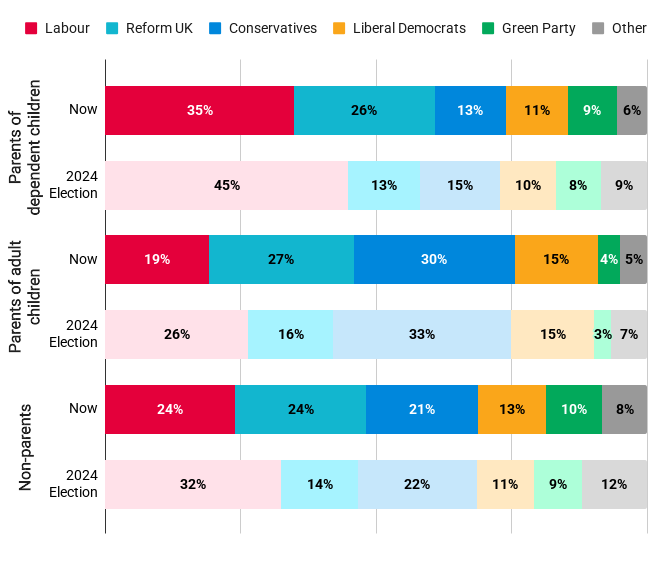One voting group who are sticking with Labour
Figure 1: Vote share in the 2024 election among parents of dependent and adult children, as well as adults without children. Based on self-reported vote intention from Stack polling.
Labour have struggled in public polling since the 2024 election. YouGov polls have shown them trading narrow leads with Reform while other polling has these two parties both sitting between 25-30%, with the Conservatives not far behind. What these polls don’t always make clear is what’s happening beneath the surface - which groups are defecting, which are sticking with them?
At Stack we’re interested in the underlying drivers of opinion. One group we’re looking at in more detail is parents. In this blog, we compare the voting behaviour of parents and non-parents.
Why are parents interesting as a voting group?
For one thing, there are a lot of them: 42% of UK households include dependent children. More importantly, they seem to vote quite differently to non-parents, as shown in Figure 1.
Parents of dependent children largely backed Labour in 2024, while those with adult children were far more likely to vote for the Conservative and Reform UK. As we show later, this is not just a function of age: it’s true that parents of dependent children are on average younger than parents of adult children, but we find that that alone does not explain the differences in voting behaviour.
Rolling forward, as Labour’s overall poll showing has weakened overall, who are parents saying they would vote for in a theoretical General Election?
Just like the wider electorate we see a lot more of them saying they would vote Reform. Figure 2 shows how each group has changed in percentage terms from their 2024 vote to now: for example, 13% more parents of dependent children say they would vote Reform than did so at the last election.
Figure 2: Voting intention (solid colour) and 2024 vote (faded colour) from Stack Vote Intention Polling among parents with dependent children, adult children, and non-parents
Figure 3: Percentage of voters defecting from the Labour party in Stack polling among parents with dependent children, adult children and non-parents
An obvious question arises: is it the fact of parenthood that explains difference, or the fact that parenthood correlates with other demographic factors? After all, parents with dependent children are likelier to be younger. We ran a regression analysis to isolate the fact of parenthood as the explanatory variable, and - as Figure 4 shows - controlling for gender, age, education, ethnicity, income, and social grade we still see that parents of dependent children are the least likely to be defecting from Labour.
Figure 4: The predicted probability of parents of dependent and children defecting from Labour since 2024, compared to those with no children, when controlled for age, gender, education, ethnicity, income and social grade. The box represents the distribution of probabilities between the 25th and 75th percentile, while the whiskers represent the wider distribution of probabilities of defecting.
The average predicted probability of defecting among non-parents is 38% compared to parents with adult children at 33% and parents of dependent children at only 24%.
Why are parents sticking with Labour?
This bears further study, but it seems likely to be Labour’s stance on education. Parents rank education as a more important issue than the wider electorate, and are seen as more trusted on it: in YouGov polling, Labour has been the top ranked party at “handling education and schools” since June 2020. Other Stack polling has also shown that high profile education policies, such as imposing VAT on private schools, are more strongly supported by parents than the wider population. This long-standing advantage, alongside stronger support for current policies, means that parents may be more inclined to trust Labour on this issue and give the party the benefit of the doubt.




